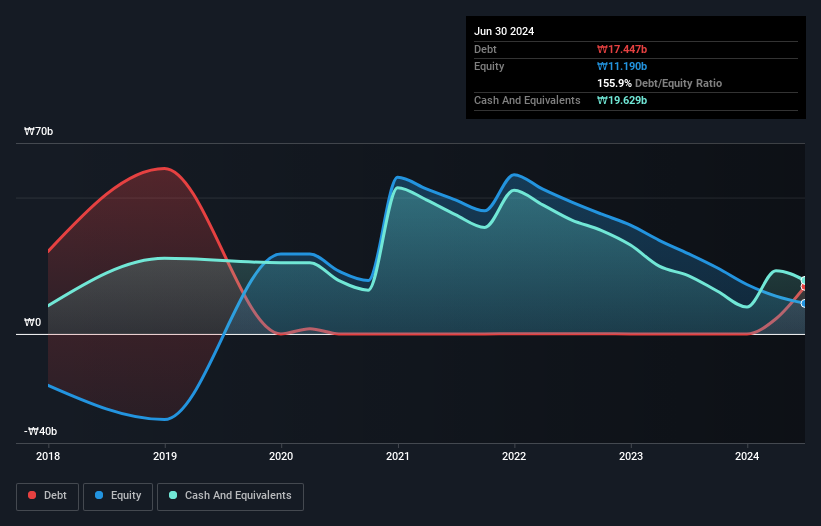- South Korea
- /
- Biotech
- /
- KOSDAQ:A317690
Health Check: How Prudently Does QuantaMatrix (KOSDAQ:317690) Use Debt?
Warren Buffett famously said, 'Volatility is far from synonymous with risk.' It's only natural to consider a company's balance sheet when you examine how risky it is, since debt is often involved when a business collapses. We can see that QuantaMatrix Inc. (KOSDAQ:317690) does use debt in its business. But the real question is whether this debt is making the company risky.
When Is Debt Dangerous?
Debt is a tool to help businesses grow, but if a business is incapable of paying off its lenders, then it exists at their mercy. Ultimately, if the company can't fulfill its legal obligations to repay debt, shareholders could walk away with nothing. However, a more frequent (but still costly) occurrence is where a company must issue shares at bargain-basement prices, permanently diluting shareholders, just to shore up its balance sheet. Of course, plenty of companies use debt to fund growth, without any negative consequences. When we examine debt levels, we first consider both cash and debt levels, together.
See our latest analysis for QuantaMatrix
What Is QuantaMatrix's Debt?
The image below, which you can click on for greater detail, shows that at June 2024 QuantaMatrix had debt of ₩17.4b, up from none in one year. However, it does have ₩19.6b in cash offsetting this, leading to net cash of ₩2.18b.

How Strong Is QuantaMatrix's Balance Sheet?
Zooming in on the latest balance sheet data, we can see that QuantaMatrix had liabilities of ₩19.8b due within 12 months and liabilities of ₩1.87b due beyond that. Offsetting these obligations, it had cash of ₩19.6b as well as receivables valued at ₩1.61b due within 12 months. So its total liabilities are just about perfectly matched by its shorter-term, liquid assets.
This state of affairs indicates that QuantaMatrix's balance sheet looks quite solid, as its total liabilities are just about equal to its liquid assets. So it's very unlikely that the ₩120.4b company is short on cash, but still worth keeping an eye on the balance sheet. Despite its noteworthy liabilities, QuantaMatrix boasts net cash, so it's fair to say it does not have a heavy debt load! When analysing debt levels, the balance sheet is the obvious place to start. But you can't view debt in total isolation; since QuantaMatrix will need earnings to service that debt. So if you're keen to discover more about its earnings, it might be worth checking out this graph of its long term earnings trend.
In the last year QuantaMatrix wasn't profitable at an EBIT level, but managed to grow its revenue by 147%, to ₩3.6b. So there's no doubt that shareholders are cheering for growth
So How Risky Is QuantaMatrix?
Statistically speaking companies that lose money are riskier than those that make money. And in the last year QuantaMatrix had an earnings before interest and tax (EBIT) loss, truth be told. And over the same period it saw negative free cash outflow of ₩18b and booked a ₩18b accounting loss. However, it has net cash of ₩2.18b, so it has a bit of time before it will need more capital. Importantly, QuantaMatrix's revenue growth is hot to trot. High growth pre-profit companies may well be risky, but they can also offer great rewards. There's no doubt that we learn most about debt from the balance sheet. But ultimately, every company can contain risks that exist outside of the balance sheet. For instance, we've identified 4 warning signs for QuantaMatrix (2 make us uncomfortable) you should be aware of.
If you're interested in investing in businesses that can grow profits without the burden of debt, then check out this free list of growing businesses that have net cash on the balance sheet.
Valuation is complex, but we're here to simplify it.
Discover if QuantaMatrix might be undervalued or overvalued with our detailed analysis, featuring fair value estimates, potential risks, dividends, insider trades, and its financial condition.
Access Free AnalysisHave feedback on this article? Concerned about the content? Get in touch with us directly. Alternatively, email editorial-team (at) simplywallst.com.
This article by Simply Wall St is general in nature. We provide commentary based on historical data and analyst forecasts only using an unbiased methodology and our articles are not intended to be financial advice. It does not constitute a recommendation to buy or sell any stock, and does not take account of your objectives, or your financial situation. We aim to bring you long-term focused analysis driven by fundamental data. Note that our analysis may not factor in the latest price-sensitive company announcements or qualitative material. Simply Wall St has no position in any stocks mentioned.
About KOSDAQ:A317690
Medium-low risk with worrying balance sheet.
Market Insights
Community Narratives



